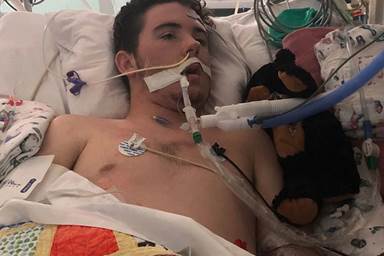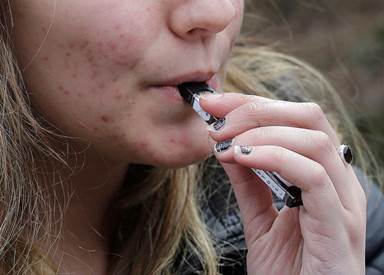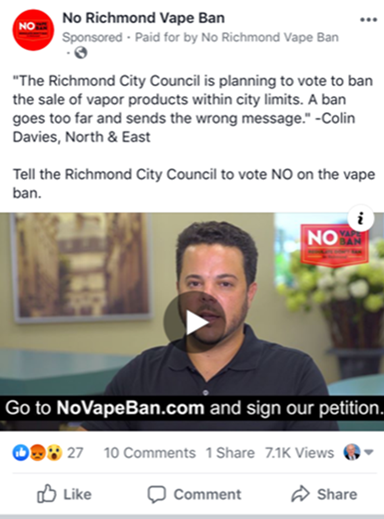|
|
- “Public health officials on Friday reported the first death in an outbreak of severe lung disease tied to vaping that has now sickened nearly 200 people in the United States.”
- “California public health authorities are investigating 21 cases of severe lung disease that appear to be connected to vaping unlicensed cannabis products and may be part of a larger outbreak that has sickened at least 150 people around the United States since June.”
- “State and federal health officials are investigating almost 100 cases of mysterious lung illnesses linked to vaping and e-cigarette use in 14 states, many of them involving teens and young adults. A large number of those stricken ill have been hospitalized, with some in intensive care and on ventilators.”
- “What I find most concerning about the rise of vaping is that people who would’ve never smoked otherwise, especially youth, are taking up the habit,” says Blaha. “It’s one thing if you convert from cigarette smoking to vaping. It’s quite another thing to start up nicotine use with vaping. And, it often leads to using traditional tobacco products down the road.”( https://www.hopkinsmedicine.org/health/wellness-and-prevention/5-truths-you-need-to-know-about-vaping)

“Shultz said she believes the chemicals Tryston was inhaling from the vape pen caused his lungs to inflame to a point where they couldn’t exchange oxygen and carbon dioxide anymore. She added that his habit had done enough damage to scar his lungs, according to CBS.”

“Within days, Alexander Mitchell had gone from being a 20-year-old hiking enthusiast to being kept alive by two machines forcing air into and out of his lungs and oxygenating his blood outside of his body.” “He went from being sick to being on death’s door in literally two days,” recalled his father, Daniel Mitchell, as he struggled to grasp the unthinkable. “The doctor said he was dying. In all honesty, I was preparing to plan a funeral for my child. I wept and wept for this boy.”

“Nearly 32% of teens in Santa Clara County have tried an e-cigarette, and 13% vape regularly, according to new data released by county health officials Wednesday.”
Here is what you should know.
On September 26, 2017, the City Council received a presentation from the Youth Tobacco Advocacy & Policy Project, highlighting the negative health impacts that tobacco products have on youth. The presentation initiated a process to revise the Tobacco Retailer License regulations to address the dangers of flavored tobacco products and reduce the availability of products.
Subsequently, the City Council adopted an ordinance amending Richmond Municipal Code Chapter 7.106 by banning the sale of menthol and other flavored tobacco products, establishing a minimum pack size for little cigars and cigars, and imposing location requirements on new tobacco retailers. Those changes went into effect on April 17, 2019 and are being actively enforced by the Richmond Police Department. The city’s current regulations prohibit the sale of all electronic cigarette products which have a taste or aroma other than the taste or aroma of tobacco. Examples of those characterizing flavors include menthol, fruits, candy, desserts, herbs and spices. The ban on flavored tobacco products covers both conventional combustion cigarettes and e-cigarettes, the use of which is also known as “vaping.”
On July 23, 2019, the City Council approved on a first reading, an expansion of the existing regulation of e-cigarettes, a prohibition on electronic cigarette products to include any device or delivery system which can be used to consume nicotine in aerosolized or vaporized form. Products would be identified as prohibited for sale if they are “new tobacco products” which require FDA premarket review and have not been issued an order approving their marketing. A second reading is scheduled for September.
People, particularly young people, are becoming seriously ill and even dying from vaping. But after the Richmond City Council followed San Francisco and Livermore in moving to ban all e-cigarettes, the industry has started to push back with an ad campaign on Facebook.

Virtually all e-cigarettes are considered “new tobacco products” under the Family Smoking Prevention and Tobacco Control Act enacted by Congress in 2009. The U.S. Food and Drug Administration (FDA) is responsible for conducting a premarket review of all new tobacco products not on the market as of February 15, 2007. The FDA’s premarket review process is intended to determine if a tobacco product is appropriate for the protection of the public health “with respect to the risks and benefits to the population as a whole, including users and nonusers of the tobacco product, and taking into account- (A) the increased or decreased likelihood that existing users of tobacco products will stop using such products; and (B) the increased or decreased likelihood that those who do not use tobacco products will start using such products.” Tobacco companies are required to report to the FDA for premarket review any information concerning health risks, the components, ingredients, additives, and manufacturing methods. Unfortunately, no e-cigarettes on the market have obtained a premarket review order, and the FDA has not taken appropriate action to enforce the requirements of the Tobacco Control Act.
In short, the FDA has not determined if any e-cigarette product is safe, and they are not enforcing their own regulations. The news has been full of ominous reports of the dangers of e-cigarettes:
Some City Council members who voted in favor of the measure on the first reading suggested that the ban was overreaching and would infringe on adults’ access to electronic cigarettes. They said they might reconsider on the second reading.
Please ask your City Council members to support this when it comes back in September. This is not the nanny state at work, this is an effort by local government to step up and help curtail the use of a potentially deadly product that has not been vetted by the federal government agency charged with reviewing it for safety.
|

